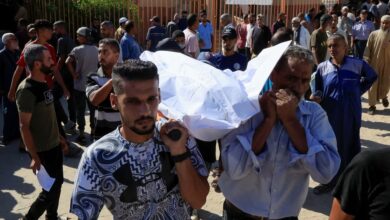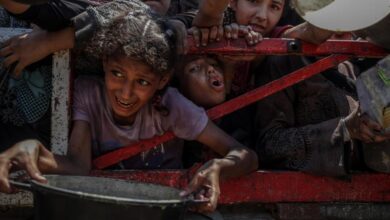NAIROBI, Kenya – East Africa's worsening famine is one of the largest humanitarian crises in decades, a US State Department official said Friday, pledging "significant" aid despite the debt ceiling impasse being debated in Washington.
The US already has pledged US$5 million to help Somali refugees on top of a previously budgeted US$63 million. Reuben E. Brigety, who is responsible for State Department assistance to refugees and conflict victims in Africa, said Washington is now studying how much more it will give.
"A great nation can do more than one thing at the same time and that is what we the United States will continue to do even in the context of the financial challenges that we are facing," said Brigety, an assistant deputy secretary.
Tens of thousands of Somali refugees are flooding camps in Ethiopia and Kenya in search of food after several seasons without rain decimated livestock and killed crops in Somalia.
Little help can reach those in the worst-hit area because an Al-Qaeda-linked militant group had banned aid work, though it recently said it would lift that ban.
Over the last several days, Brigety has visited camps in Ethiopia and Kenya, and talked with mothers and children who walked for days with little food or water.
Levels of malnutrition among refugees arriving at the camps are staggeringly high. The overall mortality rate at the camps in Ethiopia is seven people out of 10,000 per day, when a normal crisis rate is two per day, Brigety said.
At Kenya's Dadaab refugee camp, the largest in the world, Brigety spoke with a mother who arrived at the camp with six children, including a 7-year-old who has polio that she carried on her back. He said that even if Somalia sees rains again soon, the food crisis will go on for many more months.
"There are many seasoned relief professionals who would tell you we haven't seen a crisis this bad in a generation," he said. "We anticipate that this crisis will get worse before it gets better."
The crisis has swelled Dadaab's numbers to nearly 440,000 people, UNHCR said Friday.
And World Health Organization spokesman Tarek Jasarevic said at least 462 cases of measles, including 11 deaths, have been confirmed in recent months among Somali refugee children in Dadaab.
The aid group Save The Children said Friday that it has started feeding malnourished refugee children in pre-registration sites at camps in southern Ethiopia. Some 2000 refugees are crossing into Ethiopia every day, swelling the camps' populations.
Because of the overwhelming numbers, refugees are waiting days or weeks to get into the camps, Save the Children said, making the feeding programs outside a necessity.
"In terms of the sheer numbers of people affected, this is one of the worst droughts the world has seen in a long time," said Duncan Harvey, the acting country director for Save the Children in Ethiopia.




